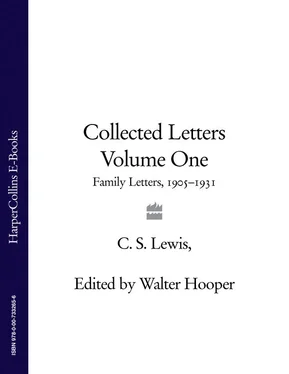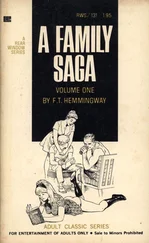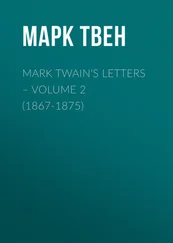your loving
son Jack
TO ARTHUR GREEVES (LP V: 115-17):
[Gastons]
July 25 1916 and be d-d to you.
My dear Arthur,
That thrice accursed fellow pupil of mine is at present sitting up in the work room so I cannot go and steal a page from his exercise book to write on, as I have been doing all the term–you must be content therefore with these odd scraps: indeed I don’t see why I should write at all, as by writing both the first and the last letter of this term I have treated you to two more than you deserve; however, I will make a note that it is your turn to begin after the holidays.
You are quite mistaken if you suppose that in asking about Dennis’ bathing things I suggested that he OUGHT to have them on–I only wanted to get a perfectly clear picture: still I don’t see any parallel between him and Bleheris in knickerbockers (a very funny word–that or Bickerknocker would be a good name for a dwarf if either of us should want one), because I take it your story is modern. But of course I quite agree that your hero is far better without them. It seems rather unnatural though to pass over any question of embarrassment in absolute silence: the fey of course, as a non-human being, may be excused, but poor Dennis might at least be allowed to blush when he comes round. Handled delicately and without any foolish humour–I am quite serious–the point might be worked a little more: what think you? Morris–who I always think manages to be as good as gold and at the same time beautifully sensuous, would have revelled in it. This week’s instalment is excellent, and your references to the Sea and the sea gods give me great anticipation of what may happen next: that next number which I am longing to get–from your own hand.
You must be easily satisfied if you think that I flatter you–when I scarcely let a sentence go past without pricking holes in it: you must also have funny ideas about my rate of composition if you think I have already finished Bleheris. As a matter of fact I write one chapter every Sunday afternoon, and having started before I came back, am always two instalments ahead of the one you get: the general course of the story was mapped out from the start, but of course is changed pretty freely whenever I like. When I said that you wouldn’t like the ‘gist’ of the thing, I meant nothing to do with what you call ‘shocked’ or ‘immodest’ (though I admit that when the heroine turns up she is in fairly sharp contrast to Alice the Saint), but that the meaning of it all is somewhat anti-Christian: however, the story and not the allegory is the important part.
I have now finished that adorable (to quote our friend Ch-anie) 132‘John Silence’: I still think ‘Ancient Sorceries’ the best, though indeed all, particularly the ‘Fire’ one, are glorious. In the last one the opening part, all about those lovely Northern Islands and the camp life–wouldn’t you love to go there?–is so very beautiful that you feel almost sorry to have the supernatural dragged in. Though the idea of the were-wolf is splendid. At what point of the story did you begin to guess the truth?
My last budget of books includes a French Everyman copy of a poet called Chenier 133(a poet you might perhaps like some day, when you come to read French verse) and a 13d. Macmillan copy of Walter Pater’s ‘Renaissance’, 134in the same edition as the ‘Letters from Hell’ I suppose. That book (Hell) by the way is not by Dostoevsky I think, because I fancy I read somewhere that it is translated not from the Russian but from the Swedish: I have noticed too (did I tell you before) that this edition has a preface by our friend Macdonald, the author of Phantastes. We must certainly get it, as the Macmillan 1/-series are, to my mind, very nicely got up. The French Everyman is quite different from the English one–I am not sure yet whether I like it more, or less–you must judge for yourself.
It is a terrible responsibility to have to guide my Galahad in poetry: a false step might turn you away altogether! I don’t think I should advise Milton: while there are lots of things in him you would love–the descriptions of Hell and Chaos and Paradise and Adam and Eve and Satan’s flight down through the stars, on the other hand his classical allusions, his rather crooked style of English, and his long speeches, might be tedious. Besides it is written in blank verse (without rhymes) and people who are beginning to read poetry don’t usually care for that. But of course you are different, and for all I know you might. You must have a good look at it in my copy and see what you think.
Endymion 135is top-hole in places, in fact nearly all the time, though somewhat ‘sticky’: it would be a very good thing to try, I think, if you would not scruple to skip whenever you found it dull: the third book especially, where he wanders at the bottom of the sea, would appeal to you strongly. The only other poems I can suggest are Arnold’s ‘Tristan and Isolde’ or ‘Balder Dead’ 136(though this is in blank verse) or some of the stories in Morris’ ‘Earthly Paradise’ 137or perhaps some of the other Rossetti’s pieces; these of course you could finish in a few hours, and some of them are not really very good. If you get an edition of Keats perhaps you would like ‘St Agnes Eve’ 138–it is shorter than Endymion, written in Spenser’s metre, and very romantic–though perhaps rather ‘sticky’ also. In sympathy with your new investment, having finished ‘Pendennis’ of which I am heartily sick by now, I have begun to read ‘Twelfth Night’ which is a charming little romance, don’t you think? The opening speech about the music is the best.
Can’t understand it being ‘too hot to practise’ as it is absolute winter here. Bah, there you see I am talking about the weather, like any fool! If I can get away–I haven’t promised, mind–I should be pleased with all my heart to go to Portsalon: indeed whenever (correctly used in this sentence) I have thought of a holiday with you, that place has come into my mind: however, we can discuss all this when we meet–next week. Can you realize? I am so looking forward to seeing you again old man, and I do hope and pray that nothing will turn up to disappoint us. I expect to arrive home on Tuesday: there is some faint danger of my father’s staying at home, but if not, perhaps you could get a day off? Oh, how we will look over all these new books together: I have something ravishing to show you in the way of paper, but that can wait.
I am writing at present a rather lengthy (for me that is) poem about Hylas, which you shall see if it is a success: but perhaps it will never be finished. By the way, I have come to the Hylas part in the Greek Argonautica. He doesn’t go into it nearly as fully as Morris, but in some ways it is better. In this version the various nymphs–mountains, Oreads, wood nymphs etc., are dancing by moonlight when they hear a mortal blundering through the wood. So they all scatter to their various trees, streams etc., and this particular one, as Hylas bent down to fill his pitcher, caught him round the neck and pulled him down; and so to bed, bon soir tu excessivement pudibonde.
Jack
TO ARTHUR GREEVES (LP V: 121-2):
[Little Lea,
Strandtown,
Belfast]
18/9/16. 139
My Dear Galahad,
It seems a mockery to think that we were talking so lately about how much better we were in our letters than in conversation–I don’t feel like that when I actually sit down to write for the first time. Somehow my being at home instead of at Bookham makes it seem strange to be away from you: it is only so few days ago that we were ragging about together in your bedroom. And now you must brush your teeth alone!
But first of all I will answer your questions. The journey home was absolutely damnable: I had to wait an hour at Letterkenny, and an hour and a quarter at Strabane. You may judge of my boredom when I tell you that I was reduced to buying a ‘Novel’ magazine 140–because everything else on the bookstall was even more impossible. My father seemed in very poor form when I got home, and fussed a lot about my cold: so everything is beastly, and I have decided–of course–to commit suicide again.
Читать дальше












